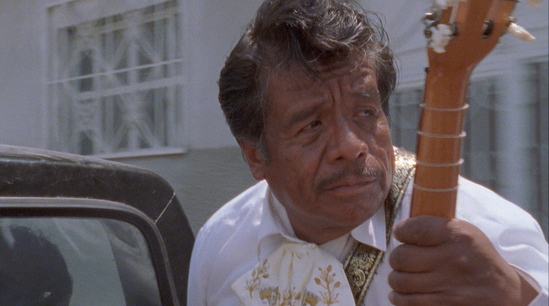 Romántico is sad, funny, visually beautiful, heart-wrenching, soulful, moving, and poignant. And I almost didn’t watch it. The Netflix description is so inaccurate – “two Mariachi singers play for unappreciative audiences in San Francisco” – that I came very close to skipping over it.
Romántico is sad, funny, visually beautiful, heart-wrenching, soulful, moving, and poignant. And I almost didn’t watch it. The Netflix description is so inaccurate – “two Mariachi singers play for unappreciative audiences in San Francisco” – that I came very close to skipping over it.
A truer description of the story line might say something about the unhappy quandary Carmelo Sanchez finds himself in: to live (illegally) in the U.S. without his wife and two daughters to support them satisfactorily, or to remain with them in Mexico but scratch out a meager existence. Even that doesn’t do the film justice, though, because telling a story is really secondary for filmmaker Mark Becker. “A cinematic portrait of a strenuous life” might come closer to what the film is all about.
We understand the strain of Carmelo’s life because he tells us. He describes how he has lived alone in San Francisco for three years without his family. He explains how little money he makes. He shares his fears about his daughters’ future. But it’s really Becker’s camera that communicates this more powerfully as it lingers on various scenes: watching Carmelo labor as he pedals his ice cream cart, seeing him bandage his diabetes-ridden leg, accompanying him as he sings Mariachi in funeral sessions through hot city streets, observing his sad face during moments of contemplation. Additional images of worshippers praying in churches, roosters hopping around in dirt yards, and prostitutes mingling in dark bars with their clients extend the portrait beyond Carmelo to a general picture of life for the poor in Mexico.
Throughout all this, Carmelo sings his sad songs for anyone who will pay and wonders if he should return to San Francisco, risking his life in the process, in order to better provide for his family. His eldest daughter acknowledges that it was easier to get by with money from the U.S. but that they’re happier all together. Carmelo’s obvious disappointment that he can’t give her an extravagant quinceañera party on her 15th birthday is offset by the obvious pleasure the family has being together for a smaller celebration.
In the end, the film allows us to observe Carmelo’s ordeals but it also us to reflect upon the struggles that many of us must cope with (chasing after income; choosing between work and family). It’s just that for some people, like Carmelo, those struggles are far more daunting.